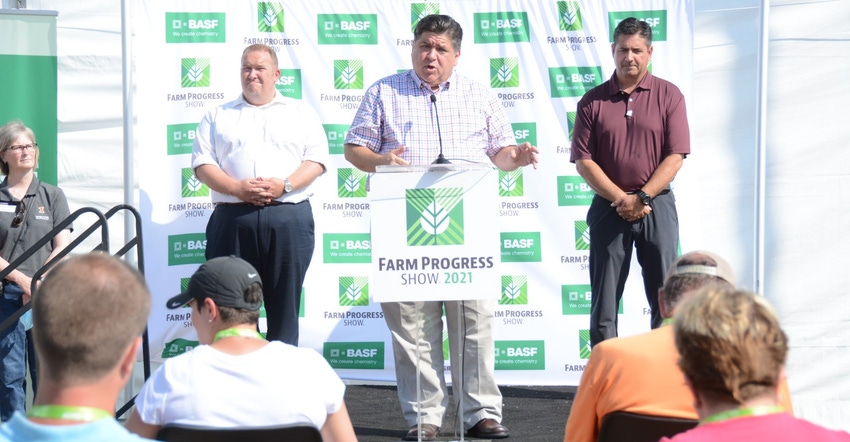
In an ongoing effort to help provide resources for farmer mental health, Illinois Department of Agriculture Director Jerry Costello II joined with Illinois Gov. JB Pritzker to discuss $500,000 of additional funds for a total of $800,000 to increase farmer stress-related mental health initiatives at an event Tuesday morning at the 2021 Farm Progress Show in Decatur.
“Farmers are stewards of their livestock, they’re stewards of crops, but many times they don't take the time to care for themselves. This leads to high levels of anxiety, depression, sometimes substance abuse, and all too often suicide,” shares Costello.
In 2019, the Farm Family Resource Initiative was established in Illinois to specifically address mental health needs of the farming and agricultural communities. Led by Southern Illinois University School of Medicine, the FFRI launched a six-county pilot program to provide $100,000 of resources to Christian, Logan, Macon, Macoupin, Morgan and Sangamon counties through a telephone hotline connecting farmers with mental health resources and providers. The following year, a total of $250,000 was appropriated for the pilot project.
In the announcement Tuesday, Pritzker announced that through funding from USDA, the program would be expanding to all 102 counties with $300,000 allocated at the state-level, paired with the $500,000 USDA grant. IDOA applied for the grant in coordination with Southern Illinois University Medicine Center for Rural Health and Social Service Development and University of Illinois Extension.
The Farmer Assistance Helpline is available 24 hours a day 7 days a week at 1-833-FARM-SOS.
Pritzker says, “These days, there are even more challenges, not the least of which is the COVID-19 pandemic during which this industry is kept right on going so that the rest of the world could stay nourished. The pressures have been intense, the need to tailor mental health resources, to better support farmers and farm families has become all the more clear today.”
Pritzker says when he took office, he started working with Sen. Scott Bennett, D-52, to turn the Family Farm Resource Initiative into law. As the vice-chair of the Illinois Senate’s Agriculture Committee, Bennett says growing up in a small town in rural America, when someone needs help, everybody finds a way to pitch in. This is another way to build on that engrained cooperation in rural Illinois.
In giving special recognition to early articles featured in Prairie Farmer written by Editor Holly Spangler, Bennett says those articles were some of the first he read “really shining a light on the problem with the mental health crisis in rural America. You gave a lot of people awareness and you got people talking,” Bennett says.
Jerry Kruse, MD, dean and provost of SIU School of Medicine, says the increase in funds will allow the FFRI to allow all counties to utilize the helpline, telehealth counseling and to an even greater degree text message and email options.
“SIU School of Medicine’s mission is to optimize the health of central and southern Illinois. The FFRI program is one the best ways to serve the region and the rural families that have been the backbone of many of the communities we serve,” says Kruse. “With partners like the Illinois Department of Agriculture, we can move the health of farm families forward.”
Additional plans for grant funding also include a voucher program for professional behavioral health services, agricultural literacy training for mental health providers to increase knowledge of agricultural community, and further mental health first aid trainings for agricultural community members.
Pritzker notes that the pandemic has called attention to telehealth. “Although in-person treatment can often be better, when it comes to behavioral health, that is one area where telehealth can be vitally important, especially when you don’t have enough inpatient or outpatient treatment that’s readily available,” he says.

Pritkzer also notes an executive order he signed also allows for the permanent continued use of telehealth. Kruse says that executive order on telehealth allowed for increased use of mental health resources. “Now in our department of psychiatry, we do more than 50% of our visits by telehealth. And the acceptance is great,” Kruse says.
Kruse says the pilot program also saw high utilization in the hotline. In addition, just the simple things such as emailing and texting and connecting to the communities have offered needed help to those in need.
This funding resulted from IDOA’s grant application for the “Farm and Ranch Stress Assistance Network” funded by USDA’s National Food and Agriculture. Funds are provided to state departments of agriculture to connect individuals who are engaged in farming, ranching, and other agriculture-related occupations to stress assistance programs.
About the Author(s)
You May Also Like






